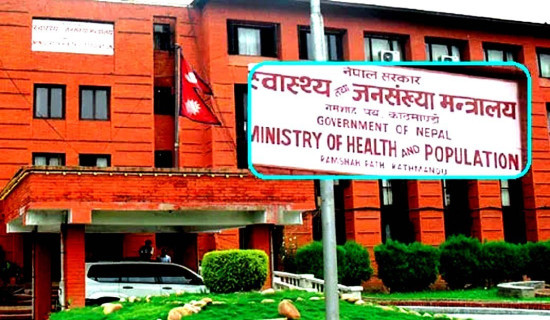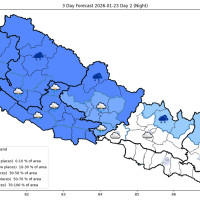- Friday, 23 January 2026
Nepali filmdom still mired in lack of accountability, transparency
Kathmandu, June 30: The film industry is considered an important sector for cultural and economic development in other countries, in Nepal, the film sector has yet to take the shape of a vibrant industry even 60 years after the first film, ‘Aama’, was produced on Nepali soil.
Instead, it occasionally gets mired in one controversy after another when the film sector starts making some visible progress. Disputes between the producers and distributors or the disputes between the filmmakers and the Film Development Board (FDB) often make news headlines. At present, the producers and FDB are in a row over the box-office data.
Moreover, it seems that our film sector is destined to be hit hard by occasional political upheavals, pandemics, and other problems every time it strives for further progress. Nepali film industry has also long been overshadowed by Bollywood and Hollywood movies. However, in recent years, an encouraging shift has been witnessed in the trends -- Nepali films are increasingly dominating local cinema theaters thanks to the efforts of young talented filmmakers to make better films.
It is evident from the fact that in the past few months, Nepali films have outperformed international films, proving that better Nepali movies can attract audience.
In recent weeks, Nepali films like ‘Mahajatra’, 'Boksi Ko Ghar', 'Pujar Sarki', ‘Pharki Pharki', and 'Gaun Aayeko Bato' have been reigning supreme in local cinema halls, even amidst simultaneous releases of Hollywood, Bollywood and South Indian films.
According to data from the FDB for the fiscal year from July 21, 2023, to June 21, 2024, a total of 128 Nepali and international films were released in Nepali cinema halls.
Among these, 45 were Nepali films, and the remaining 83 were foreign films. Amid this progress, again a dispute over box-office data has spilled in the film sector, causing a division among stakeholders.
The box office reports, typically provided by the Box Office under the FDB, have not been released for a year now. The FDB has stopped providing the box office report since the last fiscal year. It last published the box office report on July 20, 2023.
According to the box office report published on July 20, 2023, in the last fiscal year, 57 Nepali films were released. The total gross business from the sale of 2,716,217 tickets for local films amounted to Rs. 767 million. Additionally, 78 foreign films were screened in Nepal during the same period. The total gross business from these films, including the sale of 2,585,602 tickets, amounted to Rs. 794 million.
However, the FDB did not provide the box office report this fiscal year, stating that they are currently addressing technical issues with the box office server and will provide the data later. Even after a year, the FDB has been unable to maintain the box office server for accurate and transparent box office collection of films released in the cinema halls.
Bhuwan KC, Executive Chairperson of FDB, explained that they were unable to provide the box office report at this time due to ongoing maintenance of the box office server.
He said, “We are ensuring the box office server’s upkeep to ensure accuracy in government data. Currently, we are in the process of organising the box office system and plan to release the report later.”
According to FDB’s report, 147 films obtained permission for shooting in the fiscal year from July 17, 2023, to June 20, 2024.
Last fiscal year, 150 films had obtained production permission.
In absence of the data, it is difficult to maintain transparency in income and tax, and no sector can emerge as an industry unless it pays taxes.
Distributors, producers question box office report
Film producers and distributors, who play a crucial role in producing and releasing films in theaters, strongly disagree with the government’s box office report. They argue that there is approximately 25 per cent discrepancy between the government’s box office figures and those reported by the film distributors.
Narendra Maharjan, President of the Nepal Motion Picture Association, said that the box office reports from the FDB were not transparent.
He believed that if the box office reports were inaccurate and lacked transparency, they should not be published, as misleading reports could discourage film producers.
Maharjan noted that currently, Nepali films were performing well, with more Nepali films being released in theaters than foreign films.
Several Nepali films have set records by earning around Rs. 250 million, and he hoped this figure could reach Rs. 500 million.
Gopal Kaji Kayas tha, film producer and distributor, said that the box office report by the FDB was inaccurate. According to him, the board’s report showed a discrepancy of over 25 per cent compared to the data given by film distributors. He claims that the board’s report reflected collections that are more than 25 per cent lower than those reported by distributors.
Nawal Khadka, President of the Nepal Film Producers’ Association and known for being outspoken in the Nepali film industry, stated that there was a significant discrepancy of around 25 per cent between the box office reports by the FDB and the reports received by producers from the distributors.
According to him, the box office reports showed less collection than the actual earnings. He also claimed that the box office system lacked transparency, noting that 15-20 cinema halls had not installed box office systems. He further alleged that QFX, the largest cinema chain, operated its own server instead of using the FDB server for reporting, which impacted the accuracy of box office data.
Khadka criticised the FDB for its lack of transparency and suggested that if the government introduced a transparent box office system, producers would be willing to pay taxes more transparently.
He assumed that on average, about 100 films are made each year in Nepal, with an average production cost of Rs. 20 million each, totaling an investment of around Rs. 2 billion in the Nepali film industry annually.
He claimed that only about 5 per cent of released films managed to recover their investment, and similarly, only 5 per cent of the films made a profit, leaving approximately 90 per cent of films to fail.
He emphasised that the Nepali film industry provided employment opportunities to approximately 50,000 people. Rishi Lamichhane, a film and TV serial director, said that only 10 per cent of Nepali films succeeded in the market, while the remaining 90 per cent failed to even recover their investments.
Each year, around 100 films are produced in Nepal. Among them, only a few become super hits, and others manage to break even, he added.
Currently, Nepali films show promise, but quality productions are crucial. Simply screening in theaters does not ensure profitability.
Lamichhane further added that associations intended to support Nepali film development and with a need to effectively disseminate and promote films, yet many have not contributed to the industry’s growth.
The government must come up with strategies to promote Nepali films domestically and internationally. Unfortunately, neither the government nor film-related organisations have sufficiently supported the industry’s advancement, he noted.
“If the FDB and other film-related associations and organisations established to foster Nepali film and its development prove ineffective, they could be scrapped. Consequently, the government has intervened in the development of the Nepali film sector by establishing a separate mechanism.”
He also pointed out that transparency is lacking regarding Nepali film’s earnings, both in box office records and distributors' reports.
Considering the disputes, allegations, and lack of transparency, which seem to prioritise the benefits of only a few individuals rather than the overall benefits of the film industry, it appears that Nepali films will take years to evolve into a true industry and become a significant pillar for economic, artistic, and cultural development unless immediate steps are taken to address the recurring issues.
















